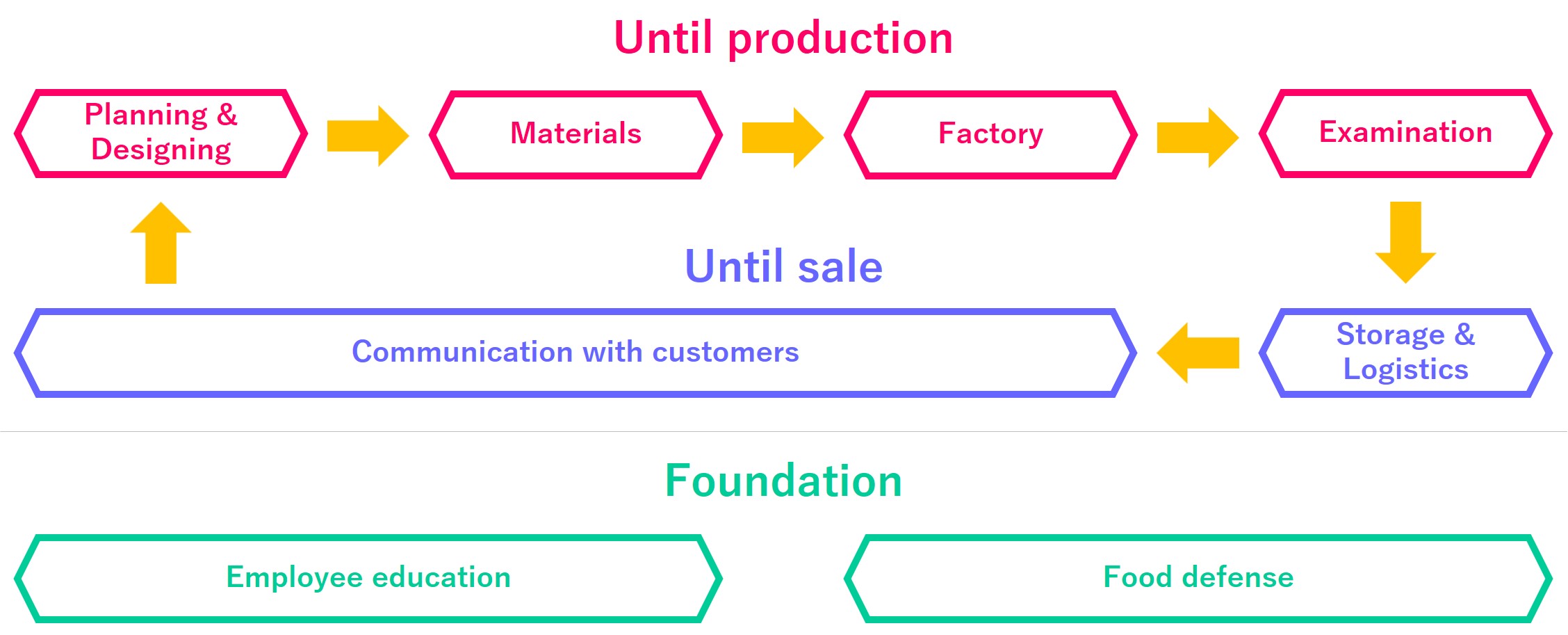Nippon Suisan Kaisha Ltd.
This page introduces the appeal of modern frozen foods based on an interview with Nippon Suisan Kaisha, Ltd. (hereinafter referred to as "Nissui") (part of which is quoted from the official website, with permission).
Date of interview (date of response): November 9, 2021
(From Nippon Suisan Kaisha Ltd.)
Nissui's Commitment and Philosophy
To provide safe, secure, and delicious products to consumers, Nissui is committed to designing products from the consumer's perspective and fully verifying the safety of each product and manufacturing process. Since their founding in 1911, they have always been committed to food safety and security, and this commitment has been passed down to the present day in our unique "Quality Assurance Charter".

Very effort is made to ensure safety and security in each process. For example, they use only raw materials for our products that have been confirmed to be safe by Nissui's standards from reliable suppliers. In addition, in terms of food defense,they have installed security cameras in their factories and at each process of storage and delivery to control access and exit, and we engage in preventive management such as conducting drills regularly to simulate an eventuality.
About Packaging of Products
In response to the problem of plastic leakage into the marine environment, which has become a social issue in recent years, Nissui established the "Guidelines for Selecting Containers and Packaging" in February 2020 as a guideline for tackling this problem through our business. They are working to reduce the amount of plastic used as much as possible in consideration of the environment while maintaining the original functions of containers and packaging, such as product protection and quality preservation. From March 2021, Nissui will begin displaying its eco-mark "Mirai no Umi e" on containers and packaging, clearly indicating it on product packages so that Nissui's efforts will be widely understood and consumers will be able to select products that meet their needs and are environmentally friendly.
In the aquaculture business, they are working to switch to floats with a lower risk of plastic spills into the ocean. The Nissui Group is engaged in the aquaculture business of salmon and trout overseas, and yellowtail, tuna, coho salmon, mackerel, and sea bream in Japan. However, the nylon cover is not as strong as other floats, and if the cover were to break, the polystyrene foam inside would shatter and spill into the ocean. Nissui solved this problem. To solve this problem, Nissui will survey and manage the use of plastic floats by Group companies engaged in aquaculture in fiscal 2019, and by fiscal 2024, will complete the switch from floats that easily leak styrene foam into the ocean to floats with a lower risk of leakage.
About Product Prices
Product prices are determined by comprehensively considering factors such as cost (cost of goods), customer needs, competitive conditions, product strength, and selling expenses.
About Walleye Pollock
The walleye pollock business, which is one of Nissui's strengths, is also utilized in the frozen food manufacturing industry. Specifically, they produce
- Fried white fish with tartar sauce
- Deep-fried Chikuwa with seaweed
- Deep-fried cheese chikuwa
- Deep-fried crabmeat
- Crab shumai
- Shrimp shumai
These are products Alaska Pollack are used in.
About Distribution
Products are delivered by Nissui's group companies and subcontractors. Their consideration in storing and delivering products is not only to handle them with care, but also to store and deliver them at the proper temperature.
Initiatives for Food Loss
The Nissui Group has identified the issue of food loss as one of its CSR materialities (key issues) as a responsibility of a company that handles food products. Led by the Food Loss Subcommittee, we are working throughout the entire supply chain to reduce food loss in the production, distribution, and consumption stages at our domestic business sites, raise employee awareness, and conduct activities targeting general consumers.